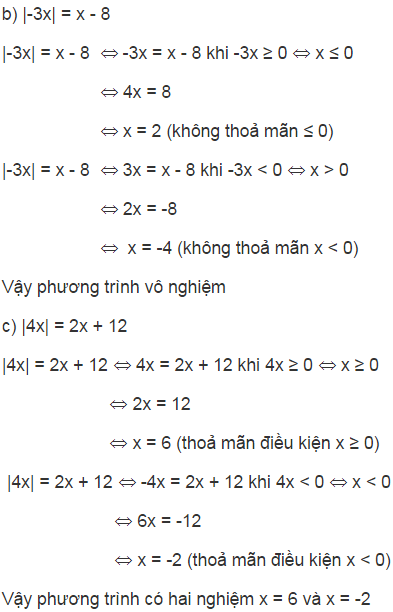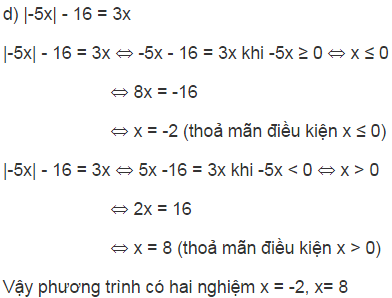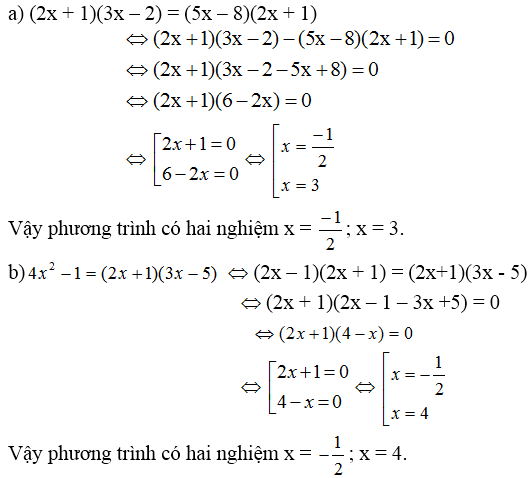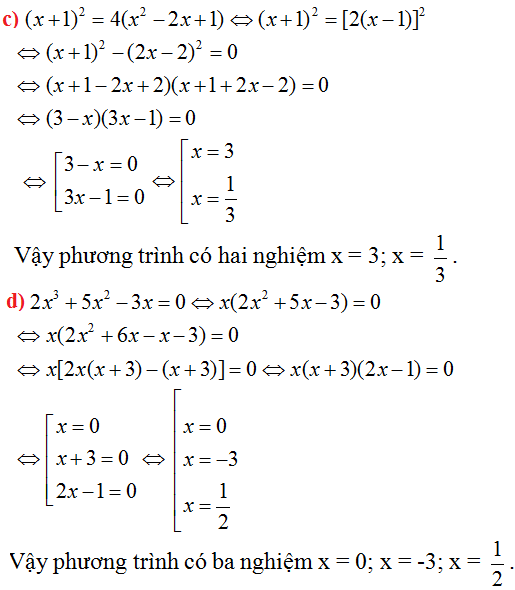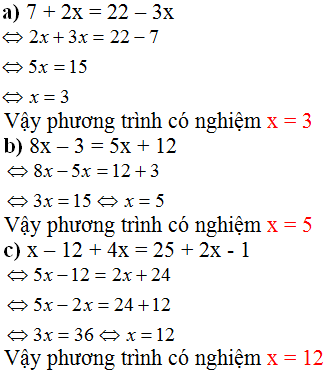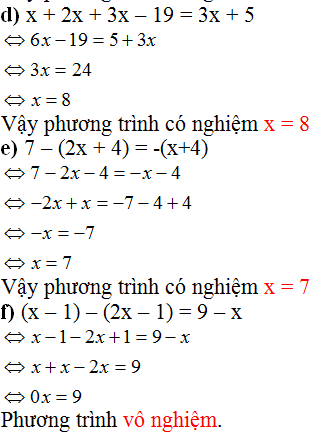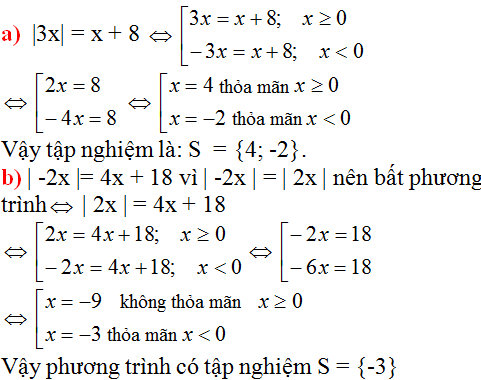Hãy nhập câu hỏi của bạn vào đây, nếu là tài khoản VIP, bạn sẽ được ưu tiên trả lời.

|2x| = x - 6
|2x| = x - 6 ⇔ 2x = x - 6 khi x ≥ 0 ⇔ x = -6 loại vì không thoả mãn x ≥ 0
|2x| = x - 6 ⇔ -2x = x - 6 khi x < 0 ⇔ 3x = 6 ⇔ x = 2 loại vì không thoả mãn x < 0
Vậy phương trình vô nghiệm.

a)(2x+1)(3x-2)=(5x-8)(2x+1)
⇔(2x+1)(3x-2)-(5x-8)(2x+1)=0
⇔(2x+1)(3x-2-5x+8)=0
⇔(2x+1)(-2x+6)=0
⇔2x+1=0 hoặc -2x+6=0
1.2x+1=0⇔2x=-1⇔x=-1/2
2.-2x+6=0⇔-2x=-6⇔x=3
phương trình có 2 nghiệm x=-1/2 và x=3

a) (x-1)(5x+3)=(3x-8)(x-1)
= (x-1)(5x+3)-(3x-8)(x-1)=0
=(x-1)[(5x+3)-(3x-8)]=0
=(x-1)(5x+3-3x+8)=0
=(x-1)(2x+11)=0
\(\Leftrightarrow\) x-1=0 hoặc 2x+11=0
\(\Leftrightarrow\) x=1 hoặc x=\(\dfrac{-11}{2}\)
Vậy S={1;\(\dfrac{-11}{2}\)}
b) 3x(25x+15)-35(5x+3)=0
=3x.5(5x+3)-35(5x+3)=0
=15x(5x+3)-35(5x+3)=0
=(5x+3)(15x-35)=0
\(\Leftrightarrow\) 5x+3=0 hoặc 15x-35=0
\(\Leftrightarrow\) x=\(\dfrac{-3}{5}\) hoặc x=\(\dfrac{7}{3}\)
Vậy S={\(\dfrac{-3}{5};\dfrac{7}{3}\)}
c) (2-3x)(x+11)=(3x-2)(2-5x)
=(2-3x)(x+11)-(3x-2)(2-5x)=0
=(3x-2)[(x+11)-(2-5x)]=0
=(3x-2)(x+11-2+5x)=0
=(3x-2)(6x+9)=0
\(\Leftrightarrow\) 3x-2=0 hoặc 6x+9=0
\(\Leftrightarrow\) x=\(\dfrac{2}{3}\) hoặc x=\(\dfrac{-3}{2}\)
Vậy S={\(\dfrac{2}{3};\dfrac{-3}{2}\)}
d) (2x2+1)(4x-3)=(2x2+1)(x-12)
=(2x2+1)(4x-3)-(2x2+1)(x-12)=0
=(2x2+1)[(4x-3)-(x-12)=0
=(2x2+1)(4x-3-x+12)=0
=(2x2+1)(3x+9)=0
\(\Leftrightarrow\)2x2+1=0 hoặc 3x+9=0
\(\Leftrightarrow\)x=\(\dfrac{1}{2}\)hoặc x=\(\dfrac{-1}{2}\) hoặc x=-3
Vậy S={\(\dfrac{1}{2};\dfrac{-1}{2};-3\)}
e) (2x-1)2+(2-x)(2x-1)=0
=(2x-1)[(2x-1)+(2-x)=0
=(2x-1)(2x-1+2-x)=0
=(2x-1)(x+1)=0
\(\Leftrightarrow\) 2x-1=0 hoặc x+1=0
\(\Leftrightarrow\) x=\(\dfrac{-1}{2}\) hoặc x=-1
Vậy S={\(\dfrac{-1}{2}\);-1}
f)(x+2)(3-4x)=x2+4x+4
=(x+2)(3-4x)=(x+2)2
=(x+2)(3-4x)-(x+2)2=0
=(x+2)[(3-4x)-(x+2)]=0
=(x+2)(3-4x-x-2)=0
=(x+2)(-5x+1)=0
\(\Leftrightarrow\) x+2=0 hoặc -5x+1=0
\(\Leftrightarrow\) x=-2 hoặc x=\(\dfrac{1}{5}\)
Vậy S={-2;\(\dfrac{1}{5}\)}

chẳng ai giải, thôi mình giải vậy!
a) Đặt \(y=x^2+4x+8\),phương trình có dạng:
\(t^2+3x\cdot t+2x^2=0\)
\(\Leftrightarrow t^2+xt+2xt+2x^2=0\)
\(\Leftrightarrow t\left(t+x\right)+2x\left(t+x\right)=0\)
\(\Leftrightarrow\left(2x+t\right)\left(t+x\right)=0\)
\(\Leftrightarrow\left(2x+x^2+4x+8\right)\left(x^2+4x+8+x\right)=0\)
\(\Leftrightarrow\orbr{\begin{cases}x=-2\\x=-4\end{cases}}\)vậy tập nghiệm của phương trình là:S={-2;-4}
b) nhân 2 vế của phương trình với 12 ta được:
\(\left(6x+7\right)^2\left(6x+8\right)\left(6x+6\right)=72\)
Đặt y=6x+7, ta được:\(y^2\left(y+1\right)\left(y-1\right)=72\)
giải tiếp ra ta sẽ được S={-2/3;-5/3}
c) \(\left(x-2\right)^4+\left(x-6\right)^4=82\)
S={3;5}
d)s={1}
e) S={1;-2;-1/2}
f) phương trình vô nghiệm

a, \(\frac{1-x}{x+1}+3=\frac{2x+3}{x+1}\)
\(=>\frac{1-x+x+1}{x+1}+2=\frac{1}{x+1}+2\)
\(=>\frac{2}{x+1}=\frac{1}{x+1}\)
\(=>2x+2=x+1\)
\(=>2x-x=1-2=-1\)
\(=>x=-1\)
vậy nghiệm của phương trình trên là {-1}
À quên ĐKXĐ của câu a là \(x\ne-1\)
Nên \(x\in\varnothing\)nhé :v

câu a tự quy đồng cùng mẫu rồi làm thôi :"))
b) \(\left[x.\left(x-1\right)\right].\left[\left(x-2\right).\left(x+1\right)\right]=24\)
\(\Leftrightarrow\left(x^2-x\right).\left(x^2-x-2\right)=24\)
Đặt \(x^2-x=k\), ta có:
\(k.\left(k-2\right)=24\)
\(\Leftrightarrow k^2-2k+1=25\)
\(\Leftrightarrow\left(k-1\right)^2=5^2\Leftrightarrow\orbr{\begin{cases}k-1=5\\k-1=-5\end{cases}\Leftrightarrow\orbr{\begin{cases}k=6\\k=-4\end{cases}}}\)
\(k=6\Rightarrow x^2-x=6\Rightarrow x^2-x-6=0\)
\(\Rightarrow x^2-3x+2x-6=0\Rightarrow x.\left(x-3\right)+2.\left(x-3\right)=0\)
\(\Rightarrow\left(x+2\right).\left(x-3\right)=0\Rightarrow\orbr{\begin{cases}x=-2\\x=3\end{cases}}\)
\(k=-4\Rightarrow x^2-x+4=0\Rightarrow x^2-x+\frac{1}{4}+\frac{15}{4}=0\Rightarrow\left(x-\frac{1}{2}\right)^2=-\frac{15}{4}\left(\text{loại}\right)\)
c)\(x^4+2x^3+5x^2+4x-12=0\)
\(\Leftrightarrow x^4+2x^3+2x^2+4x+3x^2-12=0\)
\(\Leftrightarrow x^3.\left(x+2\right)+2x.\left(x+2\right)+3.\left(x^2-2^2\right)=0\)
\(\Leftrightarrow\left(x+2\right).\left(x^3+5x-6\right)=0\)
\(\Leftrightarrow\left(x+2\right).\left(x^3-x^2+x^2-x+6x-6\right)=0\)
\(\Leftrightarrow\left(x+2\right).\left[x^2.\left(x-1\right)+x.\left(x-1\right)+6.\left(x-1\right)\right]=0\)
\(\Leftrightarrow\left(x+2\right).\left(x-1\right).\left(x^2+x+6\right)=0\)
\(\Leftrightarrow\orbr{\begin{cases}x=-2\\x=1\end{cases}\text{vì }x^2+x+6>0\left(\text{tự c/m}\right)}\)
p/s: bn tự kết luận nha :))

a, | −4x | = x + 2
* TH1: \(-4x=x+2\)
\(\Leftrightarrow-5x=2\\ \Leftrightarrow x=-\frac{2}{5}\)
*TH2: \(-4x=-\left(x+2\right)\)
\(\Leftrightarrow-4x=-x-2\\ \Leftrightarrow-3x=-2\\ \Leftrightarrow x=\frac{2}{3}\)
Vậy phương trình có tập nghiệm \(S=\left\{-\frac{2}{5};\frac{2}{3}\right\}\)

a)|3x| = x + 8 ⇔[3x=x+8;x≥0−3x=x+8;x<0[3x=x+8;x≥0−3x=x+8;x<0
⇔[2x=8−4x=8[2x=8−4x=8
⇔[x=4;x=−2;[x=4;x=−2;
x = 4 thỏa mãn ĐK x ≥ 0 và x = -2 thỏa mãn ĐK x < 0
Vậy tập hợp nghiệm S = {4;-2}
b)|-2x| = 4x + 18 vì |-2x| = |2x| ⇔ |2x| = 4x +18
⇔ [2x=4x+18;x≥0−2x=4x+18;x<0⇔[−2x=18−6x=18[2x=4x+18;x≥0−2x=4x+18;x<0⇔[−2x=18−6x=18
⇔[x=−9;x=−3[x=−9;x=−3
x = -9 không thỏa mãn ĐK x ≥ 0
Vậy phương trình có tập nghiệm S = {-3}
c)|x – 5| = 3x ⇔[x−5=3x;x≥5−x+5=3x;x<5[x−5=3x;x≥5−x+5=3x;x<5
⇔[−5=2x5=4x[−5=2x5=4x
⇔[x=−52x=54[x=−52x=54
x=−52x=−52 không thỏa mãn ĐK x ≥ 5
Vậy tập hợp nghiệm của phương trình S={54}S={54}
d) |x + 2| = 2x – 10.
⇔[x+2=2x−10;x≥−2−x−2=2x−10;x<−2[x+2=2x−10;x≥−2−x−2=2x−10;x<−2
⇔[x=12x=83[x=12x=83
x=83x=83 không thỏa mãn điều kiện x < -2
Vậy tập hợp nghiệm của phương trình S ={12 }
